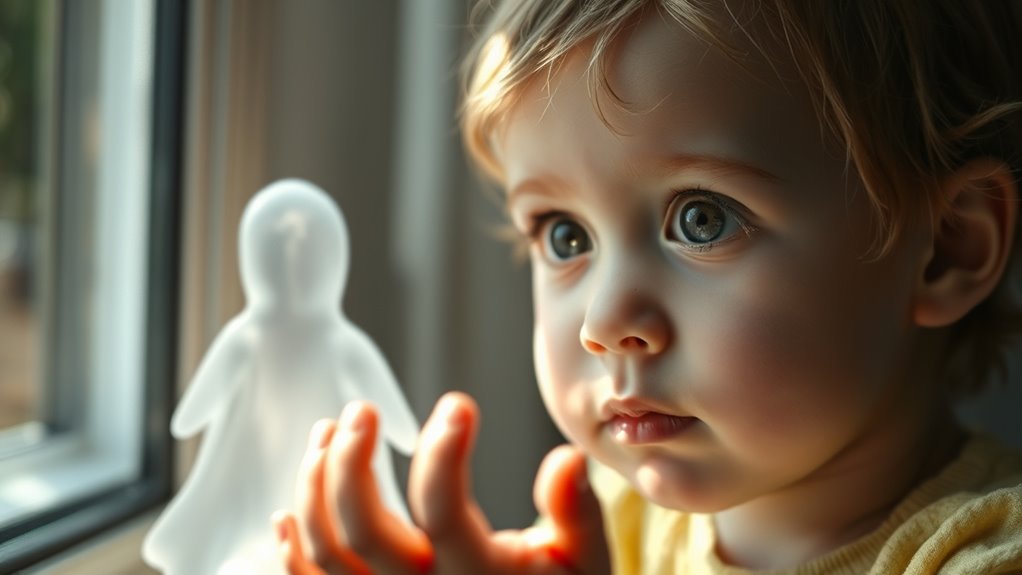It’s common for children to have imaginary friends as part of healthy development, helping them explore emotions and build social skills. Sometimes, these friends seem unusually persistent or seem to know things beyond imagination, which can raise questions about spiritual involvement. Children’s minds are more receptive to spiritual energy, so some believe these friends could be spirits, guides, or ancestors. Continuing to explore can help you better understand if this is normal or something more meaningful for your child.
Key Takeaways
- Most imaginary friends are part of normal childhood development and emotional growth.
- Persistent or unusually aware friends may suggest a spiritual presence or influence.
- Children’s heightened sensitivity can make them more receptive to spiritual or energetic entities.
- Observe if the child feels frightened or distressed by the imaginary friend, indicating possible concern.
- Consulting a child psychologist or spiritual advisor can help differentiate between imagination and spiritual encounters.

Have you ever wondered why your youngster talks about an imaginary companion? It’s a common milestone in childhood development, often seen as a healthy part of growing up. Children use their vivid imaginations to explore the world around them, and imaginary friends can serve as a way for them to practice social skills, process emotions, or simply enjoy creative play. But sometimes, parents become curious or even concerned, wondering if there’s more to these interactions. Could it be a spiritual encounter? Could your child’s imaginary friend be a spirit? While most experts see these friends as a normal part of childhood development, others believe that in some cases, these encounters might have a spiritual dimension.
Imaginary friends: normal childhood milestones or spiritual encounters? Explore the signs and what they might mean.
During early childhood, children’s minds are incredibly receptive and open to experiences that adults might dismiss as fantasy. They often create imaginary friends as a way to cope with new situations or feelings, providing comfort and companionship. These friends can help children develop empathy, learn to communicate, and even work through fears or anxieties. It’s a sign of healthy emotional growth, and most children naturally outgrow their imaginary friends as they develop stronger social skills and real-world relationships. However, some parents report that their child’s imaginary friend seems unusually persistent or appears to have specific knowledge or awareness that the child shouldn’t have. In these cases, some wonder if there’s a spiritual encounter involved—an interaction with a spirit or an unseen presence.
From a spiritual perspective, some believe that children are more sensitive to spiritual encounters because their spirits are still open and less guarded. An imaginary friend in this context might be seen as an energetic or spiritual entity making contact. Certain cultures and spiritual traditions interpret these interactions as signs of divine presence, ancestral spirits, or otherworldly guides. If you’re concerned that your child’s imaginary friend might be a spirit, it’s essential to observe their behavior and emotional state. Does the child seem frightened or distressed? Are they exhibiting ongoing, unusual behaviors? These could be signs that the interaction is more than just imaginative play. It’s also helpful to consider the spiritual sensitivity children often possess, which can influence such interactions. Developing an understanding of childhood perception of spirits can provide additional insight into these experiences. Recognizing that children’s receptive minds are particularly open to unseen influences can help you better interpret these encounters. Additionally, understanding how mindfulness can help children process and differentiate these experiences may be beneficial. On the other hand, if the child seems happy, curious, and unaffected, it’s likely a normal part of childhood development.
Ultimately, understanding whether your child’s imaginary companion is a product of healthy childhood development or a spiritual encounter depends on context and your own beliefs. It’s important to approach the situation with care and sensitivity. If you’re worried, consulting a child psychologist or a spiritual advisor who respects your beliefs can help you gain clarity. Remember, in most cases, these friends are simply a sign of your child’s creative mind and emotional growth. Whether they are purely imaginary or have a spiritual element, your support and understanding will help your child navigate this fascinating stage of development. Additionally, knowing that children’s minds are particularly receptive to spiritual influences can help parents approach these situations with greater awareness and compassion.
Frequently Asked Questions
How Can I Tell if My Child’s Imaginary Friend Is a Spirit?
If you’re wondering whether your child’s imaginary friend might be a spirit, look for spiritual signs or paranormal activity. Does your child react oddly during certain moments, or do you notice unexplained noises and movements? Trust your intuition and observe their behavior. Sometimes, these signs indicate a spiritual presence. Keep an open mind, but also consider natural explanations and consult a spiritual expert if you’re truly concerned.
Are Imaginary Friends Common in Certain Cultures or Religions?
Did you know that studies show nearly 65% of children worldwide have imaginary friends? Cultural beliefs and religious interpretations influence this, making imaginary friends common in many societies. In some cultures, these friends are seen as spirits or ancestors visiting children, while others view them as normal developmental phases. So, depending on your background, your child’s imaginary friend might be viewed differently—either as a spiritual presence or a creative playmate.
Can an Imaginary Friend Indicate Emotional or Psychological Issues?
You might wonder if your child’s imaginary friend signals emotional or psychological issues. In child development, having an imaginary friend is normal and often helps children process feelings and practice social skills. However, if your child’s behavior becomes withdrawn, anxious, or shows signs of distress, it could indicate underlying mental health concerns. Paying attention to these cues and consulting a professional can support your child’s emotional well-being and development.
Should I Encourage or Discourage My Child’s Imaginary Friend?
Think of your child’s imaginary friend as a potential secret weapon for social development and creativity enhancement. You should encourage their interactions, as it helps boost empathy and communication skills. Just like a good old-fashioned role-playing game, supporting their friend fosters imagination and emotional growth. Discouraging it might limit their social confidence or creative expression. Embrace the friendship, and watch your child’s confidence and originality flourish.
When Should I Seek Professional Help Regarding My Child’s Imaginary Friend?
If you’re concerned about your child’s imaginary friend impacting their development or childhood creativity, it’s time to seek professional help. Look for signs like your child withdrawing, experiencing distress, or if the imaginary friend causes fear or disrupts daily routines. A child psychologist can assess whether this is a normal part of development or if additional support is needed, ensuring your child’s emotional well-being and healthy growth.
Conclusion
Remember, just like a delicate butterfly fluttering through a garden, your child’s imaginary friend might be a harmless part of their imagination or a gentle spirit trying to communicate. Keep an open mind and observe their behavior, but also trust your instincts. Whether it’s just a vivid imagination or something more, your love and support provide the safest space for your child to grow. After all, every story deserves a caring, guiding presence.









